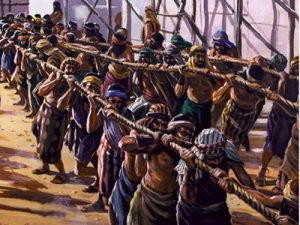When “Borrowing” Means Forever:
Last week, the RBSO got serious about freeing His people (to be), warned an intransigent Paroy and meted out seven of the ten plagues He had in mind. This week we’ll see the rest. Paroy remained steadfast and obstinate, at times aided by the RBSO who taka made him hard (his heart you chazerim) and as we open Parshas Boi, the Yiddin are still enslaved. Ober not to worry: by the time we finish the parsha, not just will the Yiddin be freed, but they will have been chased out in their gatchkis (underwear) with no time to pack and as we will learn, no time to fully bake the bread. Nu, zicher not the last time the Yiddin were chased out of a country. Sadly, many have followed suit. Is it possible that had they had been able to negotiate for late checkout, just a few more hours, mamish, maybe even one, that the gantze yom tov of Pesach and its trimmings might have looked a whole lot different, ver veyst?
After absorbing the first seven plagues, at least at times, Paroy vacillated. He was seemingly set to give in and let the Yiddin sojourn into the Midbar as they had requested, ober, the RBSO wasn’t quite done with him; more punishment was coming his way. Payback is a bitch and it was time to show him who the real boss was. Efsher you’re wondering why the Mitzrim were punished altogether when it was the RBSO who decreed and predicted to Avrohom Ovenu that his children would be enslaved in a land that doesn’t belong to them; are you? Wasn’t Paroy just doing the RBSO’s bidding? Taka an excellent kasha (question) and avada the medrish and others pontificate over this givaldige kasha. Moreover, other medroshim tell us that we must always be thankful to the Egyptians because they were our hosts during that time period. What’s taka pshat here? Ober says the Medrish azoy: though it was seemingly Paroy’s job to fulfill the RBSO’s promises to Avrohom, seemingly the power got to his head and he took his job too seriously by torturing the Yiddin. Avada you recall that just two weeks ago in Parshas Shemois, we learned that the Yiddin were forced to do manual labor; need more be said?
 Yiddin weren’t cut out for manual labor and avada we can chap why this might be considered to be torture, mamish. Yiddin are pre-programmed to become entrepreneurs, doctors, lawyers, negotiators, hondelers and –anything else for that matter. Anything but manual labor! In fact, the heylige Toirah has created business opportunities with kimat each of the 613 mitzvois given, especially the ah- says (thou shall do’s) and even many of the don’t do’s. And for those Yiddin who aren’t business minded, let the Oisvorfer remind you that very famous Toirah personalities, a good number of them, including Yaakov Oveenu, Moishe Rabaynu, Dovid Hamelech and others chapped that manual labor which we were taught included the building of cities with their own hands, was not for them: they became shepherds. Other notable Toirah personalities found their way to the Yeshiva of Sheim and Ever where they mistama honed other skills or were molested by a Rebbe gone bad. What to do? Nu, the Yiddin cried like babies and eventually the RBSO heard.
Yiddin weren’t cut out for manual labor and avada we can chap why this might be considered to be torture, mamish. Yiddin are pre-programmed to become entrepreneurs, doctors, lawyers, negotiators, hondelers and –anything else for that matter. Anything but manual labor! In fact, the heylige Toirah has created business opportunities with kimat each of the 613 mitzvois given, especially the ah- says (thou shall do’s) and even many of the don’t do’s. And for those Yiddin who aren’t business minded, let the Oisvorfer remind you that very famous Toirah personalities, a good number of them, including Yaakov Oveenu, Moishe Rabaynu, Dovid Hamelech and others chapped that manual labor which we were taught included the building of cities with their own hands, was not for them: they became shepherds. Other notable Toirah personalities found their way to the Yeshiva of Sheim and Ever where they mistama honed other skills or were molested by a Rebbe gone bad. What to do? Nu, the Yiddin cried like babies and eventually the RBSO heard.
Efsher you’re wondering why Paroy didn’t wake up and smell the coffee? Was his head farshtupped? He had already witnessed seven makois and early in this parsha, two more including Choishech (darkness) which we will discuss below. The water supply had been bloodied; insects had inflicted their own damage and the crops were already destroyed by hail. The Mitzrim had been subjected to lice, boils and more; hadn’t he seen and experienced enough? By now, he and they should have been overwhelmingly convinced that there was a higher power calling the shots. Ober Paroy the minuvil remained intransigent, in a personal battle with the RBSO. Nu avada we all know that such a battle cannot be won, or at least you should. Yet the heylige Toirah tells us that after seven plagues, Paroy seems to be dug in. The emes is that the RBSO as the heylige Toirah tells us did make his heart heavy and seemingly forced the issue; how many times has the Oisvorfer told you not to mess with the RBSO?
 Besides recounting the last of the makois (plagues) that the RBSO exacted on Paroy and the Mitzrim, and the Exodus which takes place this week and not in parshas Beshalach (next week), Parshas Boi seems to be the source of one of the most famous Jewish Minhogim (customs), one that stands ad hayoim hazeh (until today) and is rarely, if ever, violated. What is this special minhag that has become so deep-rooted and kimat universally accepted as normative behavior by so many Yiddin? It’s the general concept of ‘permanent borrowing.’ What’s pshat? It’s the idea of borrowing without the intention of ever repaying, monies and other items from friends and family. And it seemingly has its roots right here in our parsha, shreklich as they may sound. Ober how is that possible?
Besides recounting the last of the makois (plagues) that the RBSO exacted on Paroy and the Mitzrim, and the Exodus which takes place this week and not in parshas Beshalach (next week), Parshas Boi seems to be the source of one of the most famous Jewish Minhogim (customs), one that stands ad hayoim hazeh (until today) and is rarely, if ever, violated. What is this special minhag that has become so deep-rooted and kimat universally accepted as normative behavior by so many Yiddin? It’s the general concept of ‘permanent borrowing.’ What’s pshat? It’s the idea of borrowing without the intention of ever repaying, monies and other items from friends and family. And it seemingly has its roots right here in our parsha, shreklich as they may sound. Ober how is that possible?
All this mamish makes perfect sense and soon you will see how the RBSO had all this and everything else under control. The RBSO, after 210 years, had decided to free the Yiddin from back breaking slavery. They were set to leave Mitzrayim. They were on their way into the desert to receive the heylige Toirah and then, the plan was, so we believe, that they were to head into the holy land of Israel and build it up. They were to create industries, build factories, yeshivas, schools, Chinese restaurants, a few thousand sushi bars and of course a plethora of hair and nail salons for the neshei chayil (women) because chas v’sholom (heaven forbid) should they do their own hair and nails. Moreover, in this week’s parsha the RBSO also gave the Yiddin new mitzvois of every variety. We’re talking ah-says (positive commandments) and a number of lois (thou shall not do). Pesach and all its trimmings, Tifilin and more are all found here. And we must avada remember that the RBSO was concerned for his soon to be anointed Chosen People. What would they do for a living? And even if they had new enterprising ideas such as selling hand baked shmura matzo for over $25/pound, where would they get seed capital? Let’s not forget that the Yiddin were, for over 200 years, mamish slaves and were mistama not too cash rich. Some of them spent their meager wages chapping the Mitrzi meydlich (shiksas) and zicher you recall that’s how they were able to reach the 49th level of tumah (impurity). From stam (regular) slave labor, it’s unlikely that they could reach such low levels. What to do?
Nu, the RBSO is givaldig and thinks of everything, mamish. And zicher you recall that way back when, he told our zeyda Avrohom Ovenu that when this slavery would be over, they would leave with wealth. It was time to execute the plan. He wasn’t going to send the Yiddin out cash poor. They needed some pocket money, and other valuables they could turn into cash or inventory to start the economy going. Shoin: seemingly He therefore instructed the Yiddin to ‘borrow’ silver and other valuables from their neighbors (masters). And with these items plus spoils from the Sea that swallowed up the Mitzrim, yet another gift from the RBSO, a brand new economy was to begin. Gishmak mamish: the Oisvorfer is not quoting a source for his theory. In other words: this was the RBSO’s plan. Moishe and the Yiddin needed to execute. Thousands of years before Machiavelli and feygalich like him talked about the end justifying the means or enjoying the end, if you chap, the RBSO had a master plan.
And since we began Sefer Shemois three weeks ago, and including this week’s parsha, we have already encountered several instances where Moishe and the Yiddin have deceived the Mitzrim. Moreover, each such case is mandated by the RBSO Himself! Lemoshol (by way of example) Moishe asked Paroy for a three-day vacation…with the unspoken implication that the Yiddin would return timely. Over and over again, that’s what he said ober when they finally packed up and left, they never returned. Isn’t that deception? The bottom line: We lied to Paroy.
 Said Moishe and Aharoin over and again to Paroy the minuvil: “Let us go on a journey of three days in the desert that we may offer sacrifice to the Lord our God.” (Shemois 5:3). Where did Moishe hear these instructions? At the burning bush where the RBSO said: “And you and the elders of Israel will come to the king of Mitzrayim and you shall say to him: The Lord God of the Hebrews appeared to us; now let us go on a journey of three days in the desert that we may offer sacrifices to the Lord our God.” (Shemois 3:18). Ober nowhere in these pisukim (verses) do we read even once of any request for “outright freedom.” From Moishe’s first appearance before Paroy (Shemois 5) until after the last makoh (plague that killed the bechoirim (slaying of the firstborn), the only request under discussion was a journey to the desert to serve the RBSO and thereafter to return. Shtelt zich de shaylo (the question arises): why didn’t Moishe speak the emes and tell Paroy that he was a big minuvil, a nogoodnik, and that his mission was to free the Yiddin? Of course we might also ask why the RBSO told Moishe to only ask for a three day holiday ober it’s best not ask the RBSO too many questions. Ershtens (firstly) it’s mistama healthier if we stay put right here and not have the confrontation up in shomayim (heaven) and secondly, you zicher don’t want the RBSO asking you too many questions, in fact, none would be preferred. Ober asks the Akedas Yitzchok (sha’ar 35) and the Abarbanel (ch. 3, question 16) azoy: why did the RBSO command Moishe to speak deceitfully to Paroy? Instead of asking Paroy to permit the Yiddin to celebrate a brief festival in the desert, why did Moishe not simply demand their freedom from an unjust state of slavery? And as you only imagine, many ask the same question.
Said Moishe and Aharoin over and again to Paroy the minuvil: “Let us go on a journey of three days in the desert that we may offer sacrifice to the Lord our God.” (Shemois 5:3). Where did Moishe hear these instructions? At the burning bush where the RBSO said: “And you and the elders of Israel will come to the king of Mitzrayim and you shall say to him: The Lord God of the Hebrews appeared to us; now let us go on a journey of three days in the desert that we may offer sacrifices to the Lord our God.” (Shemois 3:18). Ober nowhere in these pisukim (verses) do we read even once of any request for “outright freedom.” From Moishe’s first appearance before Paroy (Shemois 5) until after the last makoh (plague that killed the bechoirim (slaying of the firstborn), the only request under discussion was a journey to the desert to serve the RBSO and thereafter to return. Shtelt zich de shaylo (the question arises): why didn’t Moishe speak the emes and tell Paroy that he was a big minuvil, a nogoodnik, and that his mission was to free the Yiddin? Of course we might also ask why the RBSO told Moishe to only ask for a three day holiday ober it’s best not ask the RBSO too many questions. Ershtens (firstly) it’s mistama healthier if we stay put right here and not have the confrontation up in shomayim (heaven) and secondly, you zicher don’t want the RBSO asking you too many questions, in fact, none would be preferred. Ober asks the Akedas Yitzchok (sha’ar 35) and the Abarbanel (ch. 3, question 16) azoy: why did the RBSO command Moishe to speak deceitfully to Paroy? Instead of asking Paroy to permit the Yiddin to celebrate a brief festival in the desert, why did Moishe not simply demand their freedom from an unjust state of slavery? And as you only imagine, many ask the same question.
One answer given is that the three day request was but an opening bargaining position, never the end game. Three days was never in the cards. Paroy chapped from the get-go that we wanted more; hence his negotiations and attempts to limit who would go each time he was ready to concede (following a bad plague that spooked him). And the fact that even such a reasonable request was refused (three days off after over 200 years of service) showed just how imperative it was for the Yiddin to skedaddle out of there. Therefore, in this case, lying was permitted to achieve the desired result. Seemingly, lying when needed to get out of a mess is ok, and that my fellow readers, is zicher good news for many, if you chap.
Moreover, it appears that Paroy and the Mitzrim dropped this entire three day excursion following plague number 10, the big one. Seemingly, the deaths of the firstborn made them want to get rid of the Yiddin once and for all. In other words: we were expelled, a concept that mistama rings familiar to many you back in your yeshiva days. Zicher the Oisvorfer can relate. And taka this too was told to Moishe by the RBSO who mamish managed every detail of the redemption operation. “And the RBSO said to Moishe, ‘One more plague will I bring to Paroy and to Mitzraim; after that he will send you from here. When he sends you, he will surely completely drive you away from here.’” (Shemois 11:1). Seemingly the three day festival was off the table, the rules had changed and there was no more discussion of a three-day pass. And whether Moishe said it or not, it was abundantly clear that he and the Yiddin were leaving for good. So there is no deception and maybe lying is not permitted. Moreover, when Paroy heard that the Yiddin had left, he wasn’t upset that they lied. He missed them as slaves and said “that we sent away the Yiddin from serving us.” (14:5). In other words, Paroy had slave master remorse.
Says the Ibn Ezra (Perush Katzar 11:4) azoy: “Know that this was a great thing, and Bnei Yisrael were completely righteous in that they did not reveal the secret (that they would not return). Paroy believed Moishe’s words, ‘a journey of three days,’ to mean that they would go and then return to Mitzrayim. Heaven forbid that [we say that] the prophet spoke a lie, for he never explicitly said, ‘We shall return.’ God’s wisdom is beyond our understanding. It would appear to me, though, that this [deception] was performed for two reasons: firstly, in order that they would give them vessels of gold and silver – for had they known that they would not return, they would not have given them. And secondly, in order that Paroy and his army would drown. For had they left with his permission, and had he not believed that they would return, he would not have pursued after them.
Ober the Abarbanel wasn’t overly impressed with the Ibn Ezra pshat and said azoy: “His explanation is insufficient, for it would not have been difficult for the RBSO to harden Paroy’s heart in order that he pursue them, without any need for deception.” Why was deception part of the plan?
Ober says the Ran so gishmak azoy: “The way the RBSO acts is to bring ‘counsel from afar’ to make His enemies fall into our hands and to avenge Himself of them … He wished to punish all the Mitzrim by the means they had used to commit evil against Israel (i.e. since they drowned the Israelite boys in the water, they too were drowned in the water) … and He wished to bring about a situation where they themselves, of their own choice would enter the water and die there. Had Moishe informed Paroy from the beginning that their time had come to be redeemed, he would certainly have agreed [to their demand] because of the makes, especially the last one, and would not have pursued them thereafter, for why would he pursue them after having willingly let them go when they were still under his rule? Therefore the RBSO did not want Moishe to tell Paroy exactly what was happening, but rather to say that they were going to offer sacrifices on a three-day journey, such that when they would tell Paroy thereafter ‘that the nation had escaped,’ he would think … that everything Moishe had done had not come from the RBSO but rather had been done deceitfully and fraudulently. For had it not been thus, why would Moishe have fooled him by saying that they were going only to offer sacrifices? For this very reason He commanded, ‘Let each man ask his neighbor [for vessels of silver and gold];’ even though the money rightfully belonged to the Yiddin and they could have taken it openly, God nevertheless told them to dissemble … so that when it was told to the king of Mitzrayim and his nation that Yiddin were escaping, there is no doubt that they regarded them as bandits and swindlers… and this, without doubt, brought them to pursue them… The intention behind all of this was hidden from Israel, and perhaps even from Moishe.
 In plain English: the deceptions were directed toward attaining revenge on Paroy and all his army. The negotiations conducted between Moishe and Paroy were not of the type that follow regular diplomatic rules. Rather, the negotiations were merely one aspect of the war between them, and in a war, deception is permissible, since its purpose is to bring about the enemy’s downfall. Sounds mamish like the government!
In plain English: the deceptions were directed toward attaining revenge on Paroy and all his army. The negotiations conducted between Moishe and Paroy were not of the type that follow regular diplomatic rules. Rather, the negotiations were merely one aspect of the war between them, and in a war, deception is permissible, since its purpose is to bring about the enemy’s downfall. Sounds mamish like the government!
Veyter: As we mentioned above, here in our parsha the Yiddin are instructed (Shemois 12:35-36) to “borrow” of the Egyptians’ vessels as they leave Mitzrayim). Nu, let’s see if we can answer each of these concepts and then in Oisvorfer fashion, efsher tie them together.
Says the heylige Toirah (Shemois 3:21-22) azoy “I will put the favor of this nation in the eyes of Egypt, and it will be that when you go, you will not go empty. Each woman should ask of her neighbor and of the one in whose house she dwells vessels of silver and vessels of gold and clothing; you shall put them on your sons and on your daughters. Shtelt zich di shylo (the question arises): what’s pshat here? The Yiddin were told to borrow the above mentioned items from the Mitzrim but seemingly had no intention of returning said items. Is this called borrowing? Does this borrowing nebech ring familiar? Is deceit kosher? Nu, mistama if the RBSO mentioned these instructions more than once in the heylige Toirah, they must be important ober as you can only imagine, many commentators were epes (somewhat) bothered by this story. Doesn’t leaving with great wealth take away from the gantze redemption and our understanding of what took place? Was this the reason for the entire slavery? Moreover, why was it necessary for the Yiddin to leave with great wealth? Did the Yiddin need gold and silver in the desert where they would spend the next forty years?
Ober since we already determined (one page up) that lying to win the war is good and kosher and since Paroy and the Mitzrim were the enemy, this also answers the question of what the RBSO said at the burning bush. ‘Each woman will ask of her neighbor [vessels of silver and gold]’. Seemingly the lying and the borrowing without intent of returning the borrowed goods, were all part of the master plan set forth by the RBSO- all to fulfill His promise. Gishmak mamish .
 Moreover, it appears that the Yiddin were still owed back wages. Seemingly Paroy wasn’t even paying the mandated minimum wages and as such the Yiddin, though under the guise of borrowing, were merely taking what was rightfully theirs. Did Paroy the minuvil pay the Yiddin for their hard labor? A nechtiger tug (fuggetabout it). Nu, zurg zich nisht (not to worry) because the RBSO had a master plan, doesn’t He always, and let’s taka learn why the RBSO is so special and should be loved and revered by all. Says Rashi (Brochos 9A) and many other places that the RBSO in His magnificence had remembered a promise He made to Avrohom Oveenu, way back when, and what was it? As it is written: “Afterwards, they will go out with great wealth” (Bereishis 15:14).
Moreover, it appears that the Yiddin were still owed back wages. Seemingly Paroy wasn’t even paying the mandated minimum wages and as such the Yiddin, though under the guise of borrowing, were merely taking what was rightfully theirs. Did Paroy the minuvil pay the Yiddin for their hard labor? A nechtiger tug (fuggetabout it). Nu, zurg zich nisht (not to worry) because the RBSO had a master plan, doesn’t He always, and let’s taka learn why the RBSO is so special and should be loved and revered by all. Says Rashi (Brochos 9A) and many other places that the RBSO in His magnificence had remembered a promise He made to Avrohom Oveenu, way back when, and what was it? As it is written: “Afterwards, they will go out with great wealth” (Bereishis 15:14).
As you can only imagine, the medrish is replete with questions and ideas on what went down here, beside the Mitzrim into the river. Ershtens (firstly) we can posit that efsher the Yiddin taka did not mean borrowing at all, instead they meant gifting. And taka some Medroshim cite sources that demonstrate that the root word She-al may taka refer to a request for an outright gift, and one should not necessarily read that word to mean as only ‘borrowing’ (as it is usually translated). And taka so says Reb Saadia Ga’on. Says Rabaynu Bachya: that the Yiddin were commanded to ask the Mitzrim for their gold and silver vessels not as a loan but as gifts. Shoin! They said borrow, they meant permanently. And it was entirely permissible and just for the Yiddin to do this. And taka why? Nu, the Yiddin had worked for the Mitzrim as involuntary slaves for 210 years and their compensation due was immeasurable. And according to Toirah law, a Yid who works as an eved (slave) for seven years is showered with gifts when he is freed from servitude. The Yiddin were certainly entitled to a great deal of compensation and gifts. Borrowing meant gifting, mamish similar to when people call you for a loan, though in most cases you’re left to figure this out on your own when the loan is nebech not repaid.
Some say that borrowing meant a mutual exchange. In leaving, the Yiddin were forced to abandon properties, fields, vineyards, and many items too heavy to schlepp. The slaves had fields and other possessions? If this is taka emes, the entire slavery has epes a different feel to it. Taka this approach is also mentioned by the Chizkuni and the Malbim (chapter 3). Said he: that the Yiddin mamish possessed fields and vineyards, homes, and furniture; not too shabby for slaves. And they were farzorgt (worried) about these assets as they were getting ready to leave. Were the slave masters going to buy them out or just plunder their homes and possessions, leaving them empty handed? Therefore, to rectify this potential injustice, the RBSO informed them that they would not leave destitute. Shoin- all justified! And as they were leaving, they asked their neighbors to take their homes and property in exchange for silver and gold articles of equal value, which would be more portable. Gishmak, no? The acquisition of Mitzri (Egyptian) gold and silver was therefore simply a mutual exchange of possessions, and no ethical questions arise. And as an added benefit, it was seemingly also a tax free transaction.
Says the heylige Gemora (Sanhedrin 91b) azoy: the gold, silver and other assets the Yiddin ‘borrowed’, represented unpaid wages. Says the Medrish quoting the heylige Gemora azoy: Thousands of years later, the Mitzrim came before Alexander the Great and registered a claim against the Yiddin, demanding that they should be compensated for all the wealth that the Yiddin had seized from their forefathers a millennium earlier. In response to this claim, Gevia ben Psesia, acting as the Jews’ defense attorney (and avada many Jews need a defense attorney now and then, if you chap), noted that the Yiddin had not received any wages for all the centuries they toiled as slaves in Mitzrayim. Thus, justice demanded that the Yiddin be granted a form of reparation – i.e. compensation for the exploitation they had endured at the hands of their masters. He (Gevia) responded in front of the Greek monarch, “From where do you bring proof that we took the money?” They responded, “From the Toirah.” He countered, “Then I will bring proof from the Toirah, where it states that the Jewish people dwelled in Mitzrayim for 430 years (210 years as slaves). Please give us the wages of 600,000 workers for that time period, and we shall return the gold which we took.” Nu and with that brilliant defense, the Mitzrim requested a three-day recess, and never returned to the courtroom. Note that they too asked for a three day recess. Gishmak even if not emes, though zicher it could be.
Another pshat: the possik states that by asking their neighbors for all these costly items the Yiddin were just following orders. They did “as Moishe had commanded them to borrow…” (Shemois12:35). Accordingly, the Yiddin were fulfilling a prophet’s holy command, and not asking out of greed. Shoin: guilty with an explanation?
Says another Medrish: that the Yiddin were mamish reluctant to take the wealth of Mitzrayim and had to be begged by the RBSO and Moishe to borrow the gold and silver from the Egyptians. Were these real Yiddin or were these the Baal t’shuvas; which FFB (frum from birth) Yid turns down gold, silver and wealth? Moreover, the Yiddin were fearful that such an action could provoke their former masters into pursuing them and that’s taka just what happened as they made their way out and towards the river. Say The Sforno and Chizkuni: taka this was part of the RBSO’s master plan to get rid of the oppressors. One thing is clear and not in dispute: the Yiddin left with the gold and silver and hightailed out of Mitzrayim. Efsher this was one of the tests to see if they could taka be called Yiddin. Only a goy would leave that behind. Veyter.
Speaking of borrowing without intent to repay, the Oisvorfer is reminded of an emese myseh (true story) of a phone call he received mistama 10 years back with but minutes to go before the onset of the shabbis. A famous and choshovo Rabbi was on the phone and said azoy: how do we know that a Minhag (custom) is even stronger than a Din (Jewish law)? Said the Oisvorfer: Rabbi, it’s kimat (nearly) time for licht-bentching (candle-lighting) but tell me please- how? Said he: because it’s well known that a person who borrows money from his friend, is halachically bound to repay the loan: the minhag however is not to! Shoin!
A gittin Shabbis!
The Heylige Oisvorfer Ruv
Yitz Grossman

